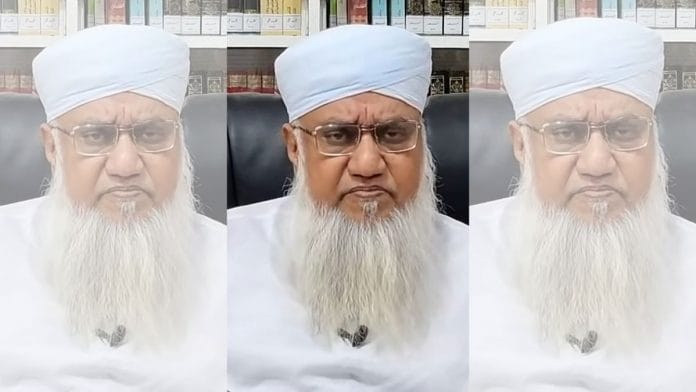Elections should prioritise pressing issues that shape people’s daily lives – policies, governance, and real challenges on the ground. But, as was evident in the 2024 Maharashtra assembly polls, the focus often shifts to narrative building, disregarding the substantive concerns that truly matter to the electorate.
A video featuring Maulana Sajjad Nomani, a member of the All-India Muslim Personal Law Board, intensified this narrative battle during the Maharashtra elections. Here, the AIMPLB spokesperson was seen appealing to all Muslims to socially boycott fellow Muslims who voted for Narendra Modi in the Lok-Sabha elections. In the video, he also says that a Muslim who votes for the Bharatiya Janata Party should change their name to a Hindu one like Ghanshyam. Maharashtra Deputy Chief Minister Devendra Fadnavis criticised Nomani’s appeal, labelling it as “vote jihad.” He called for a “dharma-yudh (religious war)” of votes to counteract what he saw as an attempt to divide voters based on faith.
Free and fair elections are crucial in democratic societies. This ensures the establishment of a political leadership that’s acceptable to all members of society. Foundational principles demand that citizens participate fully in the democratic process – they should have the freedom to campaign, express support or opposition to any party, and exercise free speech. But at what point does exercising these freedoms cross into the realm of polarisation, manipulation, or undermining the very principles of democracy?
Don’t mix religion & politics
Sajjad Nomani, as an Indian citizen, has the right to speak in favour or opposition of any political party. But it’s interesting to see how his appeal was only directed toward Muslims, proof of his attempt to position himself as a leader of the community. The misfortune of Muslim society in India is that religious leaders try to lead the community on political and social issues, and many political parties do not see any problem with this.
While I disagree with Asaduddin Owaisi on various issues, I have no qualms with him speaking or acting as a leader of the community; his background and credentials put me at ease. What bothers me more is when people like Nomani, meant to guide Muslims on spiritual and religious matters, venture into political discourse. Such involvement risks blurring the lines between religion and politics, diminishes the spiritual integrity of such scholars, and fuels polarisation and controversy that could harm the very community they aim to serve.
Sajjad Nomani’s boycott call isn’t a mere political sermon—it is a threat. And I do not understand why no one from the liberal or progressive side can see it for what it is. While religious leaders have the right to express their views, employing tactics that involve social exclusion and questioning individuals’ faith based on their political choices should be seen as coercive, divisive, and infringing upon personal freedoms.
Liberals may view his comments within the broader context of India’s political discourse, where appeals to religious and community identities are not uncommon. But how are they failing to recognise the alarming quality of Nomani’s rhetoric, especially in light of incidents of violence against Muslim political workers? Take West Bengal, where reports of a Muslim BJP worker being killed surfaced, or Kashmir, where a Muslim BJP worker was killed in a terror attack earlier this year.
Also read: I am shocked Indian ‘liberals’ aren’t supporting Iranian woman Ahoo Daryaei protesting hijab
Boycott calls don’t serve a purpose
By putting the condition that being Muslim is contingent on voting against the BJP, Sajjad Nomani is employing the same tactics of ex-communication (takfir) used by most religious extremist organisations. Terrorist groups such as ISIS, for example, have relied heavily on takfir to label Muslims who disagree with their ideology as apostates. The core tenet of being Muslim, as outlined in the Quran, is the declaration of Shahada (the first kalma). Yet, individuals and groups seem to invent new conditions based on their agendas.
The threat of expulsion has been often employed to control the Muslim community and suppress any attempts at reform within. Muslim women like Shayara Bano, who faced relentless discrimination for campaigning against triple talaq, are a prime example. What’s even more telling is that women like her were not affiliated with the BJP or any political party—they were simply fighting for justice and equality. But they became targets of the same regressive mindset that weaponises religion to maintain the status quo.
It is sad to see that those who identify as liberal-progressive in India often do not hesitate to make opportunistic coalitions or take support from regressive elements from the Muslim community. While problematic statements from Hindu regressive elements or BJP leaders are met with widespread condemnation, I do not see the same anger toward Nomani’s speech. This glaring inconsistency not only undermines the credibility of the liberal-progressive narrative but also emboldens individuals who use religion as a tool for coercion and division.
If we truly want dissenting voices to thrive in India, we must apply the same principles to the Muslim community as we do to others. Criticising the BJP, or questioning why Muslims (or any Indian) should or should not vote for the party is a valid exercise. Debate, discourse, and dissent are fundamental elements of a democracy, after all. But when such arguments turn into coercion or threats of ex-communication, they cross a dangerous line. The community needs to break free from this mindset for its own well-being.
Amana Begam Ansari is a columnist. She runs a weekly YouTube show called ‘India This Week by Amana and Khalid’. She tweets @Amana_Ansari. Views are personal.
(Edited by Zoya Bhatti)






